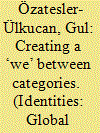| Srl | Item |
| 1 |
ID:
160562


|
|
|
|
|
| Summary/Abstract |
Can positive social contact between members of antagonistic groups reduce prejudice and discrimination? Despite extensive research on social contact, observational studies are difficult to interpret because prejudiced people may select out of contact with out-group members. We overcome this problem by conducting an education-based, randomized field experiment—the Urban Youth Vocational Training program (UYVT)—with 849 randomly sampled Christian and Muslim young men in riot-prone Kaduna, Nigeria. After sixteen weeks of positive intergroup social contact, we find no changes in prejudice, but heterogeneous-class subjects discriminate significantly less against out-group members than subjects in homogeneous classes. We trace this finding to increased discrimination by homogeneous-class subjects compared to non-UYVT study participants, and we highlight potentially negative consequences of in-group social contact. By focusing on skill-building instead of peace messaging, our intervention minimizes reporting bias and offers strong experimental evidence that intergroup social contact can alter behavior in constructive ways, even amid violent conflict.
|
|
|
|
|
|
|
|
|
|
|
|
|
|
|
|
| 2 |
ID:
176989


|
|
|
|
|
| Summary/Abstract |
Through the findings of research on Alevi and Sunni intermarriages in Izmir, Turkey, this article shows how partners in such marriages recognize differences between Sunniness and Aleviness, how they identify themselves in relation to these categories and define them, and how their marriage influences their identifications. The article presents how the intermarried spouses’ own definitions of their background categories reveal the influences of the historical construction of these categories in relation to each another, political stances and current negotiations. Self-identifications and perceptions of differences are handled within these influences while unifying criteria transcending the boundaries of these categories enable them to build on a sense of ‘we’. The findings show the spouses’ ambiguous, fluid, relational and contextual definitions and identifications within their understandings of one another as parts of a ‘we’, their ways of living together despite categorical and group differentiations, and negotiations within local and global discourses.
|
|
|
|
|
|
|
|
|
|
|
|
|
|
|
|